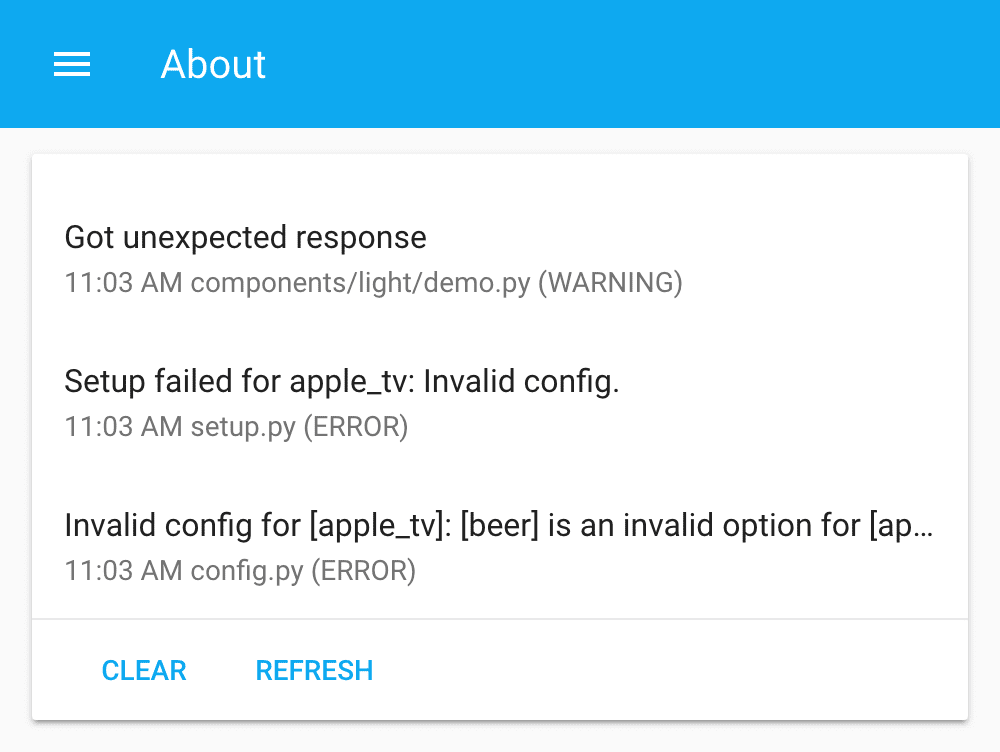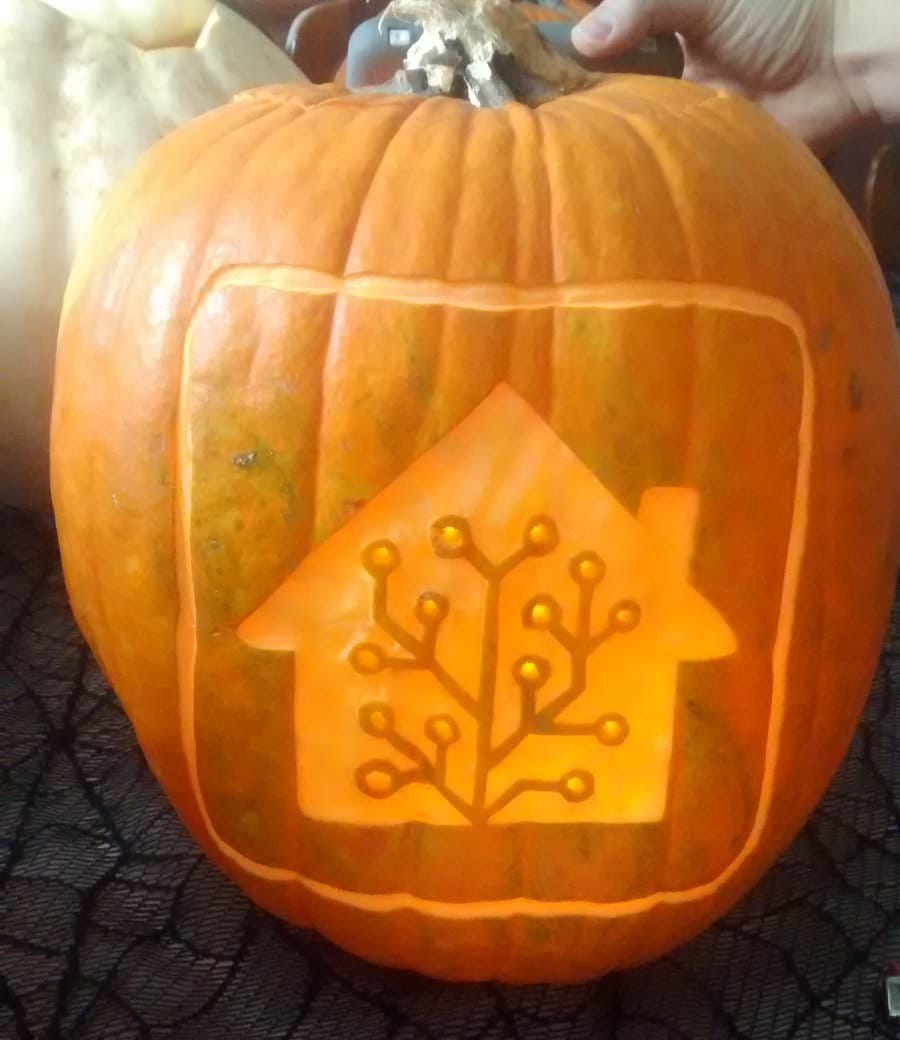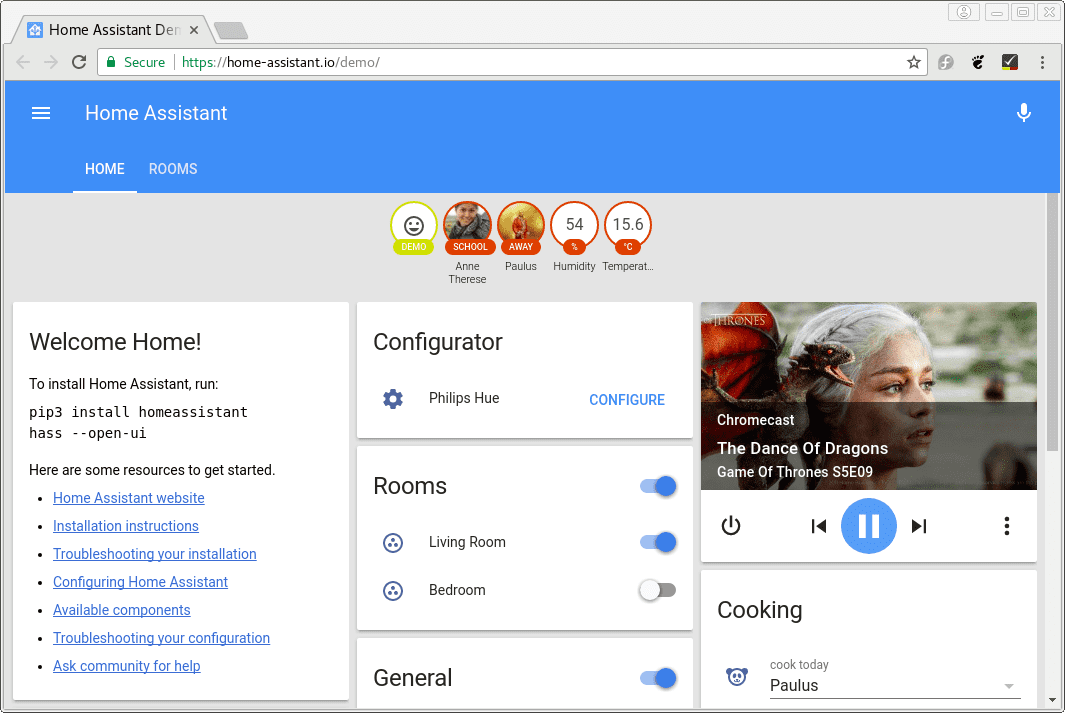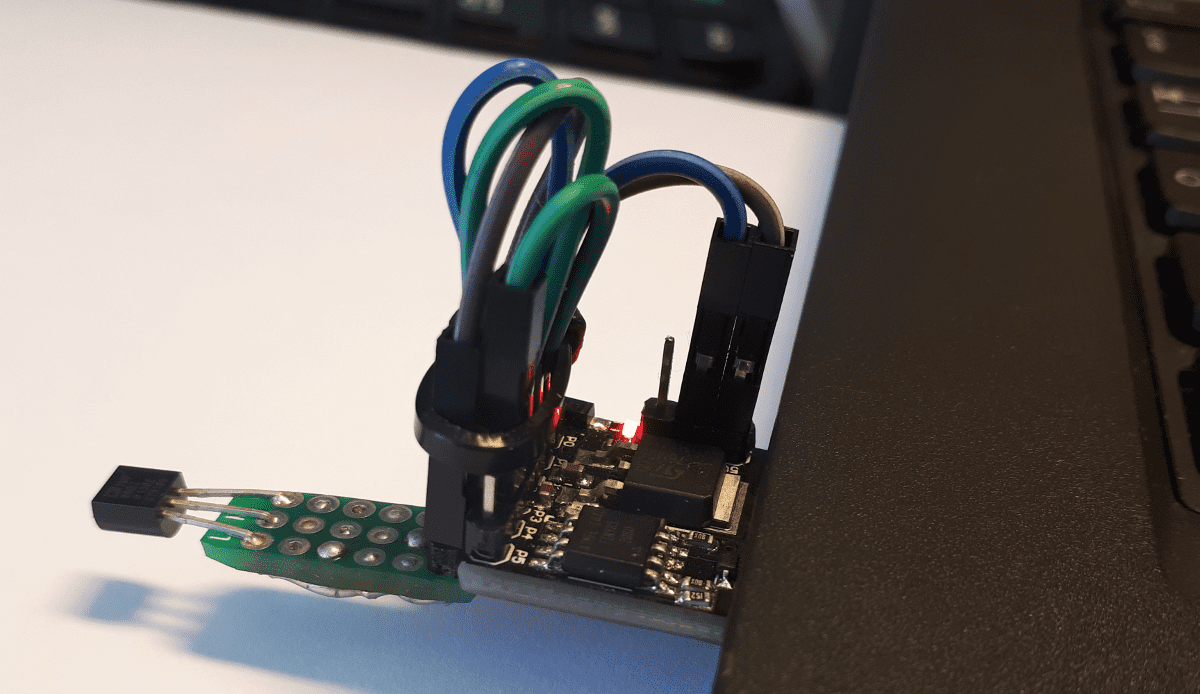Blog
0.58: More translations, faster frontend, system log
The Hass.io release of 0.58 will be delayed by a couple of days because Pascal is moving this weekend.
Translation update
Translations are up and running in full speed. Shortly after the last release we got our translation pipeline figured out. @armills
Talking about our translators, we now have 445 people with an account to help with translations. Not bad for 3 weeks!
And because more translations is more better, @robbiet480
Learn more about how to help with translations
Frontend improvements continue
Thanks to @Andrey-git
To try it once, add ?latest to your Home Assistant bookmark. To make it the default on your installation, update your config to look like this:
frontend:
javascript_version: latest
For Custom UI users: your custom UI will need to be updated before it can work with the new version of the frontend.
System log enhanced
Our about screen that shows the error logs has gained a nice upgrade by @postlund
 Screenshot of the about screen showing the system log.
Screenshot of the about screen showing the system log.
New Platforms
- pyLoad download sensor (@iMarkus
- #10089 ) (sensor.pyload docs) (new-platform) - Add LaCrosse sensor platform (@hthiery
- #10195 ) (sensor.lacrosse docs) (new-platform) - Refactor Neato botvac components as a vacuum (@jabesq
- #9946 ) (neato docs) (sensor.neato docs) (switch.neato docs) (vacuum.neato docs) (breaking change) (new-platform) - Add platform and sensors for Vultr VPS (@GenericStudent
- #9928 ) (vultr docs) (binary_sensor.vultr docs) (sensor.vultr docs) (new-platform) - Adds support for Tile® Bluetooth trackers (@bachya
- #10478 ) (device_tracker.tile docs) (new-platform) - Support presence detection using Hitron Coda router (@arilotter
- #9682 ) (device_tracker.hitron_coda docs) (new-platform) - Add basic backend support for a system log (@postlund
- #10492 ) (system_log docs) (new-platform) - New sensor viaggiatreno. (@fabfurnari
- #10522 ) (sensor.viaggiatreno docs) (new-platform)
Release 0.58.1 - November 21
- Fix yweather (@tinloaf
- #10661 ) - Properly initialize Harmony remote (@amelchio
- #10665 ) (remote.harmony docs) - Handle the new version of HydroQuebec website (@titilambert
- #10682 ) - Fix for time_date sensor (@etsinko
- #10694 ) (sensor.time_date docs) - Frontend fixes (@andrey-git
@armills @balloob )
If you need help…
…don’t hesitate to use our very active forums or join us for a little chat
Reporting Issues
Experiencing issues introduced by this release? Please report them in our issue tracker
Secure remote access to Home Assistant using Tor
Routers and gateways provided by broadband internet providers are very often limited regarding features and configuration possibilities. Most of these limitations affect the opportunities that allow users to set up port-forwarding, DMZ, and DHCP reservations since the suppliers figured that average user does not want (or should not) deal with these. Making your Home Assistant instance available remotely (and securely), in this case, becomes more difficult. Are you one of those unlucky ones?
There are a couple of options available to achieve a remote (and secure) accessible Home Assistant instance. However, almost all of them require you to: open one or more ports on your router, expose a public IP address, and require you to reserve a fixed IP in your DHCP server (or set up a static IP address). Examples of these are:
- Combination of DuckDNS (or similar), Let’s Encrypt (SSL), DHCP reservation, and forwarding a port to your device running Home Assistant.
- Setup a VPN, which often requires more hardware and software. Additionally, it also requires port-forwarding, DHCP reservation and most likely DuckDNS (or similar).
- SSH tunnel-ing. Which still requires port-forwarding, DHCP reservation and most likely (yeah, you’ve guessed it) DuckDNS (or similar).
There is, however, another option available that most people do not realize: Tor
The most amazing part? It is super easy to set up!
Read on →Home Assistant and The Things Network (TTN)
The Home Assistant integration for The Things Network (TTN)
At the moment Home Assistant only supports one MQTT broker. This means that you can’t subscribe to topics which are located on different brokers.
Read on →Translating Home Assistant
 The Home Assistant sidebar in 12 different languages.
The Home Assistant sidebar in 12 different languages.
Translations
As mentioned in the 0.57 release notes, Home Assistant has launched a translated frontend. With the immediate influx of translations, we’ve made integration with a translation tool a top priority. @c727
Lokalise allows us to open up translations for all of our multilingual users willing to contribute. Users can join the project using our public signup link
Now that we have a system in place, expect a lot more of the interface to be translatable soon. We still have some technical hurdles to overcome, but the hardest work is behind us now. The community has already done an outstanding job of providing translations. The future is looking bright!
0.57: Translations, Hacktoberfest, Timers
 The Home Assistant sidebar in 12 different languages.
The Home Assistant sidebar in 12 different languages.
Whaaaaaats up everyone?! 😁 It’s been another crazy 2 weeks here at the virtual Home Assistant headquarters with a ton of great contributions from all over the world. New features, bug fixes, performance improvements. It’s a lot so let’s jump right in.
Translations
The first great feature, if you haven’t guessed it yet from the screenshot above: we are now able to translate the UI! Currently the translations are limited to the sidebar menu items. Even without a translation tool available, our contributors have jumped in and submitted translations for these menu items in over twenty languages! Home Assistant will automatically pick an available translation based on your browser settings, or a translation can be manually selected in the configuration panel.
We’re currently working on an integration with the web based translation tool lokalise.co
Frontend improvements
As part of getting translations to work, we did a lot of cleanup work on the frontend side. The re-organization should allow us to iterate faster on the frontend. We’ve already seen a lot of clean up as part of this thanks to @armills and @andrey-git for keep raising the quality!
Hacktoberfest
Hacktoberfest
Hacktoberfest is obviously about the people contributing to open source. Big thanks to everyone that has taken the time to learn our code base and make contributions. We hope it was a pleasant experience and show how great open source can be. Hope to see many contributions in the future 👍
Here are our Hacktoberfest 2017 stats. It’s a miracle everyone is still alive:
- Main repo: 273 Pull requests
were merged out of 307. - Docs repo: 295 Pull requests
merged out of 310. - Frontend: 57 pull requests
merged.
This means that we processed over 20 Pull requests per day. The result was already visible in 0.56. This release is almost the same. In those releases we were able to add over 40 new integrations.
IKEA TRÅDFRI
Good news and bad news on this front. The bad news is that IKEA changed the internal API for TRÅDFRI with a firmware update, breaking the Home Assistant integration. The good news is that they were nice enough to email us with instructions on the backward-incompatible changes
Long time contributor @lwis
 @clhett01 made us a pumpkin ([via Twitter](https://twitter.com/clhett01/status/925481848612032512))
@clhett01 made us a pumpkin ([via Twitter](https://twitter.com/clhett01/status/925481848612032512))
Timer
Okay, one more highlight before we’ll let you check out the changelog. Contributor @danielperna84
New Platforms
- Introducing Ring Door Bell Camera (including StickUp cameras) and WiFi sensors (@tchellomello
- #9962 ) (ring docs) (binary_sensor.ring docs) (camera.ring docs) (sensor.ring docs) (new-platform) - add irish rail transport sensor (@ttroy50
- #9883 ) (sensor.irish_rail_transport docs) (new-platform) - Add fail2ban sensor (@fronzbot
- #9975 ) (sensor.fail2ban docs) (new-platform) - add eph ember controls (@ttroy50
- #9721 ) (climate.ephember docs) (new-platform) - whois domain lookup sensor (@GenericStudent
- #10000 ) (sensor.whois docs) (new-platform) - Add Deluge Switch Component (@HydrelioxGitHub
- #9979 ) (switch.deluge docs) (new-platform) - SNMP switch (@kirichkov
- #9840 ) (switch.snmp docs) (new-platform) - Microsoft tts (@jeroenterheerdt
- #9973 ) (tts.microsoft docs) (new-platform) - Telldus Live: Device without methods is a binary sensor (@rasmusbe
- #10106 ) (tellduslive docs) (binary_sensor.tellduslive docs) (new-platform) - Support for NO-IP (@fabaff
- #10155 ) (no_ip docs) (new-platform) - Linode (@ryanm101
- #9936 ) (linode docs) (binary_sensor.linode docs) (new-platform) - Nederlandse spoorwegen (@b10m
- #10136 ) (sensor.nederlandse_spoorwegen docs) (new-platform) - added Yesss SMS platform (@flowolf
- #10177 ) (new-platform) - Add Sytadin Traffic component (@gautric
- #9524 ) (new-platform) - Added new Clickatell SMS messaging Notify Platform (@davlloyd
- #9775 ) (notify.clickatell docs) (new-platform) - Add Random binary sensor (@fabaff
- #10164 ) (binary_sensor.random docs) (new-platform) - Add gc100 platforms and component (@davegravy
- #10159 ) (gc100 docs) (binary_sensor.gc100 docs) (switch.gc100 docs) (new-platform) - Timer component (@danielperna84
- #9889 ) (timer docs) (new-platform) - integration with Remember The Milk. (@ChristianKuehnel
- #9803 ) (remember_the_milk docs) (new-platform) - Luftdaten sensor (@lichtteil
- #10274 ) (sensor.luftdaten docs) (new-platform)
release 0.57.1 - november 4
- Fix login screen not showing when no password stored (@balloob
)
release 0.57.2 - november 5
- Update frontend with fixes for setting temperature on climate card (@balloob
) - Fix setting max brightness for TRADFRI (@ggravlingen
- #10359 )
release 0.57.3 - november 11
- Tellstick Duo acync callback fix (@stefan-jonasson
- #10384 ) (tellstick docs) - Fixed update() method and removed
dingfeature from stickupcams/floodlight (@tchellomello- #10428 ) (binary_sensor.ring docs) (camera.ring docs) (sensor.ring docs)
If you need help…
…don’t hesitate to use our very active forums or join us for a little chat
Reporting Issues
Experiencing issues introduced by this release? Please report them in our issue tracker
Home Assistant and SSH
Most system engineers are very familiar with SSH (Secure shell)
In this blog post we are going to use the tunneling option of SSH to create a secure connection and forward the Home Assistant frontend to a local system.
Read on →Home Assistant Demo
If you are planning to host a Home Assistant meetup or doing a talk, then you probably want to show Home Assistant to an audience. You could use a Wireless router, bulbs, switches, and a single board computer to do a realistic demo. For a workshop, this is what I usually do because I think that working with physical hardware is more fun for the participants. The issue is that you need time to set up, power and space. For a talk or in a location, where you only have a beamer and a table or a lectern, the physical hardware approach is not very convenient.
The simplest way to show Home Assistant to others is the online demo at /demo/
 Home Assistant's online demo
Home Assistant's online demo
Serial analog sensor
This blog post is about building a super simple analog sensor for Home Assistant. The physical sensor will send the data over its virtual serial port as it will be connected over USB. The concept is similar to the TEMPer USB devices. The attatched sensor type to the microcontroller can be any kind of sensor which gives you an analog signal from brightness over soil moisture to temperature.
The microcontroller will only transfer the voltage of an analog input pin which will be between 0 and 1024. Home Assistant will use the new serial sensor platform to read the data and perform actions to convert the raw reading into a real measurement. This means that you don’t have to adjust the code of your microcontroller if you change the attached sensor type.
 The assembled sensor
The assembled sensor
0.56: Skybell, Google Assistant, Travis CI and Toon
We reached another milestone aka number: 10000. GitHub is assigning numbers to pull requests and issues and the “10000” is a PR
If you haven’t noticed, there is now a glossary that collects some Home Assistant relevant terms. Talking about the documentation: @DubhAd
Google Assistant / Google Home integration
This release includes a new component to integrate Home Assistant with Google Assistant by Phil Kates
Hacktoberfest
Hacktoberfest is still on and so far we have received a lot improvements. We can’t make any promises to review everything by the end of October, but we are trying to make sure that you will get your t-shirt.
Map
The map is now its own component. Similar to configuration (config:), it will not show up without adding it to your configuration.yaml file.
map:
Travis CI
Why not observe your Travis CI
New Platforms
- Add Arlo alarm control panel component (@vickyg3
- #9711 ) (alarm_control_panel.arlo docs) (new-platform) - Abode Temp, Humidity, and Light Sensor (@MisterWil
- #9709 ) (abode docs) (sensor.abode docs) (new-platform) - Introducing support to Travis-CI (@tchellomello
- #9701 ) (sensor.travisci docs) (new-platform) - Skybell (@MisterWil
- #9681 ) (skybell docs) (binary_sensor.skybell docs) (camera.skybell docs) (light.skybell docs) (sensor.skybell docs) (switch.skybell docs) (new-platform) - Xiaomi Smart WiFi Socket and Smart Power Strip integration (@syssi
- #9138 ) (switch.xiaomi_miio docs) (new-platform) - Add notification platform for Rocket.Chat (@webworxshop
- #9553 ) (notify.rocketchat docs) (new-platform) - Tesla bug fixes. (@zabuldon
- #9774 ) (tesla docs) (binary_sensor.tesla docs) (climate.tesla docs) (lock.tesla docs) (sensor.tesla docs) (switch.tesla docs) (new-platform) - Split map panel out into its own component (@cgarwood
- #9814 ) (map docs) (breaking change) (new-platform) - Support for Yi cameras (@bachya
- #9787 ) (camera.yi docs) (new-platform) - Add namecheap DNS component (@Munsio
- #9821 ) (namecheapdns docs) (new-platform) - Uptime sensor (@fronzbot
- #9856 ) (sensor.uptime docs) (new-platform) - Cloud connection via aiohttp (@balloob
- #9860 ) (new-platform) - Google Actions for Assistant (@philk
- #9632 ) (google_assistant docs) (http docs) (new-platform) - A new platform for controlling Monoprice 6-Zone amplifier (@etsinko
- #9662 ) (media_player.monoprice docs) (new-platform) - Add serial sensor (@fabaff
- #9861 ) (sensor.serial docs) (new-platform) - Add Toon support (@Boltgolt
- #9483 ) (toon docs) (climate.toon docs) (sensor.toon docs) (switch.toon docs) (new-platform)
0.56.1 - October 22
- Fix device update / entity_id with names (@pvizeli
- #10029 ) - fix temperature/humidity sensors valid values (@bieniu
- #10024 ) (sensor.xiaomi_aqara docs)
0.56.2 - October 23
- Fix gateway illumination sensor value (@bieniu
- #10045 ) (sensor.xiaomi_aqara docs) - Fix device update/
entity_idwith names (@rytilahti- #10053 ) (switch.tplink docs) - Remove warning component / Update event trigger for UI created (@pvizeli
- #10060 )
If you need help…
…don’t hesitate to use our very active forums or join us for a little chat
Reporting Issues
Experiencing issues introduced by this release? Please report them in our issue tracker
Home Assistant Podcast #10
Show notes available on the Home Assistant Podcast Website


